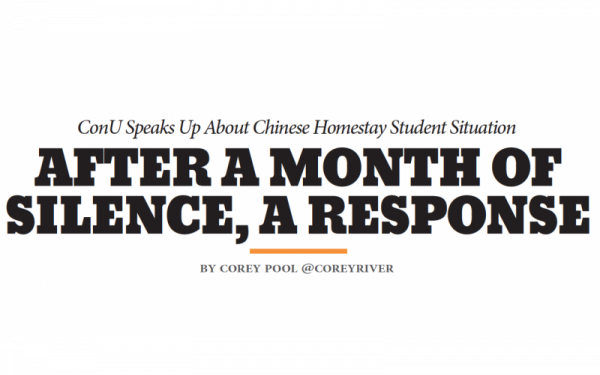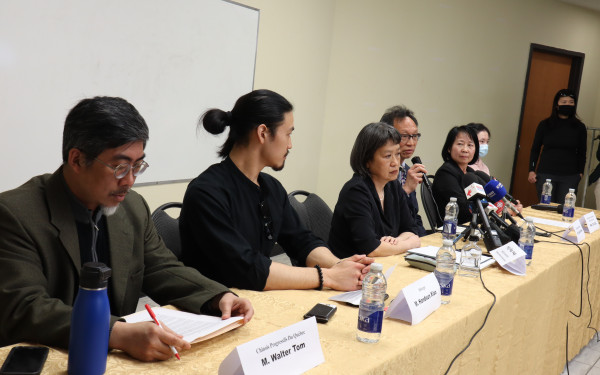Editorial
On Misunderstandings and Miscommunications
The Link ’s grievances with Concordia have historically been about policy. Now, they’re about morality.
We’ve fundamentally disagreed with their methods and priorities, but we had an understanding that we shared a mutual goal—the goal of improving this university.
On Friday, that idea of that common purpose was shattered.
A press release sent out by Concordia—titled, “Concordia responds to homestay allegations”—proved that the administration is more engrossed with its own image than the wellbeing of its students.
The university is defending Peter Low, its recruitment agent for Chinese students, the man multiple foreign students allege set them up in deplorablely expensive living situations.
In the statement, the university refers to “complaints reported on by the media.” These complaints, made by Chinese students recruited through Concordia’s program, are not detailed in the press release. But as the publication that broke the initial story, we’re happy to do that for them.
There was the complaint that the students were given meagre meals that would have disappointed Oliver Twist.
There was also the issue that Low charged students exorbitant amounts of money, typically in cash. And don’t forget that these students—who were placed in homestays by Low—never got to sign leases.
Concordia, however, wasn’t releasing a statement to address these month-old issues.
The day before the statement was released, The Link published excerpts of emails sent by Low to a student in which he claimed homestays were a requirement and that residences were reserved for Montreal-based students only.
It’s an outrageous lie, and leaves no room for ambiguity or “misunderstandings.”
But the university is confident that “written exchanges [provided by Low] and other evidence gathered to date suggest that the complaints reported on by the media are likely the result of miscommunication.”
Surely they’re joking.
While the university claims it hasn’t found enough students to suggest a systemic problem, no one else who touched this story has struggled with that.
The Link referred to six students in the original article and quoted two more in a follow-up this week. Based on what we’ve heard off the record, we’re confident that this is just the tip of the iceberg.
Mass-emailing 5,200 international students is not “gathering evidence.” It’s a weak attempt at contacting a group of people who will probably ignore one more university message in an inbox filled with International Student Office newsletters—if they can even read them in the first place.
The Concordia Student Union’s legal clinic and the Housing and Job Bank have spoken with more. The Graduate Students’ Association managed to find students to speak to the public at a rally organized to support them.
But somehow, Concordia says they’re not hearing from the students themselves. Well, the way they’re going about things, they won’t.
Concordia, stop touting an email as a grand attempt at getting in touch.
Mass-emailing 5,200 international students is not “gathering evidence.” It’s a weak attempt at contacting a group of people who will probably ignore one more university message in an inbox filled with International Student Office newsletters—if they can even read them in the first place.
These are students specifically in this situation because English is their second language. Trying to get in touch with them exclusively in a language you know they’re not proficient in is as tactless as it is unproductive.
But let’s assume for a moment that the students in this situation did open, read and understand the implications of the email.
Put yourself in their shoes. These students come from a country that gives them good reason to be skeptical of putting their names on the line and sticking their necks out. There’s a reason so many of them have insisted we not use their last names.
In some cases, their families have spent everything they had in order to allow them to pursue a Canadian education. Now you’re asking them to take the initiative of starting a conversation with the university, after we referenced students whose parents specifically instructed them to not do that.
Concordia seems to think that these students walked in to our newsroom and opened up about their life stories. That’s not how it went down.
Our reporters spent four weeks reaching out to individuals and gaining their trust.
It would have taken longer if not for the large volume of research already done by the CSU and HoJo.
There is absolutely no reason that, with all its resources and connections, the university can’t seem to take the time or make the effort to do the same work our two reporters did.
There is no excuse for their lacklustre “evidence-gathering” efforts.
Concordia, next time there is a rally for these students—send someone.
Call up as many current and former homestay students as possible and just let them talk. Call the Concordia Chinese Students Association for help. Visit these students in their classes in the School of Extended Learning. There are plenty of ways to get the word out.
More importantly, don’t brush off these very real experiences as “misunderstandings.”
Don’t tell these students they don’t understand what happened to them.
And please do not email the press to say that Peter Low—the man at the centre of this web of deception—“adhered to the highest standards.”
That just tells all of us how low you set the bar.

_ED1(WEB)_900_597_90.jpg)



_600_375_s_c1.png)